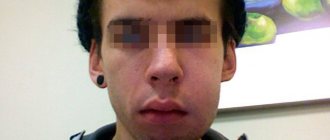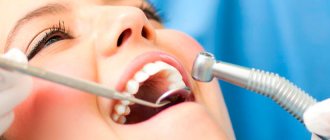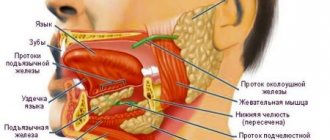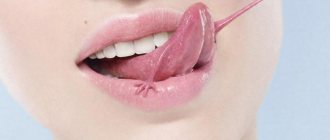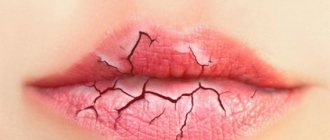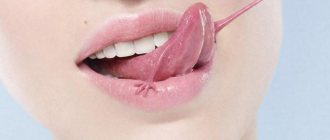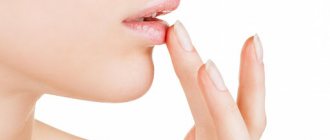Reasons for appearance
This disease belongs to the genus of polyetiological ones. This means that a variety of reasons can lead to its appearance:
- injuries to the oral mucosa;
- problems with the gastrointestinal tract;
- disturbances in the functioning of the hypothalamus;
- nervous system disorders;
- side effects from taking medications.
Mouth injuries
Injured mucous membranes of the oral cavity are called the main cause of glossalgia. Microtraumas caused by foreign objects and sharp edges of teeth lead to impaired blood circulation in the capillaries, which results in stagnation of blood in the mucous membrane.
Endocrinology
Disturbances in the functioning of the gastrointestinal tract and their chronic diseases are the second common cause of unhealthy sensations in the tongue. Most often, people with reduced gastric secretion, chronic colitis, cholecystitis, and hepatitis suffer from this.
Hypothalamus
Pathologies of the hypothalamus lead to disruption of all basic functions of the body, including such important ones as: the cardiovascular system and the digestive system. These deviations are also reflected in the state of the tongue.
Nervous system
Nervous disorders, depression, constant stress, overwork, or psychological trauma are another reason.
Side effects
A famous expression says: “everything is medicine and poison.” Some medications, when used in incorrect proportions or when the body is sensitive to taking them, give side effects, expressed in glossalgia.
Other reasons
Other causes include: stomatitis, infectious inflammation of the tongue, salts of heavy metals and other chemical poisoning.
Factors influencing development
It has been proven that this disease most often affects females - approximately three quarters of patients are female, which is explained by the structural features of the nervous system and its greater sensitivity to irritants. Glossodynia or glossalgia can develop under the influence of a number of reasons, including local and general ones. Common ones include:
- Gastrointestinal diseases;
- Psycho-emotional factors - worries, stress, fears, fatigue, irritability, and so on;
- Obsessive-compulsive neuroses such as cancerophobia or syphilophobia;
- Diseases of the endocrine system, for example, diabetes;
- Diseases of the heart and blood vessels;
- Iron deficiency.
Local factors relate directly to the oral cavity. They can develop both under external influence and due to internal reasons:
- Poor-quality fillings and prostheses that cause chronic injury to soft tissues;
- Diseases of periodontal tissues;
- Galvanosis;
- Pathological abrasion of teeth;
- Difficulty in teething;
- Surgical interventions in the presented area;
- Anatomical deviation in the structure of the temporomandibular joint, its deformation;
- Diseases of the oral cavity of an allergic nature, which include medicinal stomatitis;
- Tongue biting is a bad habit.
It has been proven that a combination of even two factors can cause such a deviation in the functioning of the nervous system as glossodynia. In this case, two specialists must deal with the treatment of pathology at once - a dentist and a neurologist.
In some types of phobias, pain in the tongue develops as a psycho-emotional response of the subconscious to an event that has occurred or is occurring. Such situations are referred to as “swallowed tongue” or “bitten tongue.” Often this disorder can develop due to fear of oral sex.
Our team of doctors
Maxillofacial surgeon, Implantologist
Bocharov Maxim Viktorovich
Experience: 11 years
Dental surgeon, Implantologist
Chernov Dmitry Anatolievich
Experience: 29 years
Orthopedist, Neuromuscular dentist
Stepanov Andrey Vasilievich
Experience: 22 years
Endodontist, Therapist
Skalet Yana Alexandrovna
Experience: 22 years
Orthopedic dentist
Tsoi Sergey Konstantinovich
Experience: 19 years
Dentist-orthodontist
Enikeeva Anna Stanislavovna
Experience: 3 years
General information
Glossalgia refers to diseases of the tongue, as the sympathocomplex has a number of causes: neurogenic, symptomatic, ischemic, caused by local factors. Usually the process is polyethylogical and does not cause morphological changes; it is expressed in the form of paresthesia and hyperesthesia , which are felt as a burning sensation and perversion of taste.
The course is long-term, from several months to several years, and is associated with systemic diseases, psychological disorders or depression .
Very often, the burned oral mucosa is considered exclusively as one of the symptoms of systemic diseases, especially those affecting the nervous system, and through local irritants, glossodynia manifests itself and increases discomfort, leading to relapse.
Glossalgia of the tongue: symptoms, diagnosis and photos of manifestations
This disease may have the following symptoms:
- burning or painful tingling sensations;
- feeling of discomfort while eating or talking;
- pain of various types;
- numbness of the tip or entire tongue;
- decreased salivation.
The last symptom is observed in more than 30% of patients.
Unpleasant sensations are usually localized on the sides, at the tip, or at the root of the tongue. They manifest themselves especially strongly in the evening after a busy day at work or under severe stress. When eating occurs, symptoms may either intensify or not manifest themselves at all.
Treatment of glossodynia
Treatment goes through several stages. First of all, when risk factors are identified, their elimination begins:
- A complete sanitation of the oral cavity is carried out;
- High-quality fillings are placed;
- Rational prosthetics or re-prosthetics are carried out;
- Correction of the bite (its height in particular);
- Treatment of oral pathologies.
At the same time, treatment of the psycho-emotional environment is carried out. This therapy includes sedative and sedative medications. They are selected depending on the initial condition, but preference is still given to lighter medicines on a natural herbal or homeopathic basis. But if serious psycho-emotional problems are identified, they may prescribe the use of tranquilizers, sedatives, antidepressants and strong antipsychotics, which are prescribed by prescription.
This type of treatment cannot be abandoned, otherwise analgesics will only mask the problem for a while. For severe pain, agents with a local anesthetic effect can be used, which usually include lidocaine, benzocaine or novocaine. But long-term use can reduce the effectiveness of the drug, and therefore, first of all, deal with the elimination of the root causes.
The next stages of full recovery are:
- Identification of pathologies of internal organ systems - heart, blood vessels, gastrointestinal tract, endocrine system with the appointment of adequate therapy;
- Physiotherapeutic treatment;
- Spa treatment.
Treatment for glossodynia also takes some time. Therefore, you need to be patient. If there are external factors that provoke this disease, then you should begin to eliminate them. The patient should avoid stress and, if possible, get rid of bad habits. You should also not refuse psychotherapy, since it will help you find the true roots of the problem.
The patient is monitored by neurologists and a dentist, as well as those specialists whose pathologies have been identified. In general, glossodynia can occur for many years without treatment, without causing complications. Accordingly, this pathology only causes discomfort, but does not directly pose a threat to life and health.
Sources used:
- Notes of a good dentist / E.G. Aghajanyan. - M.: Omega, 2011.
- James, William D.; Berger, Timothy G.; et al. Andrews' Diseases of the Skin: Clinical Dermatology. — Saunders Elsevier, 2006.
- Treatment of diseases of gums and teeth using traditional and non-traditional methods / E.L. Isaeva. - M.
- National Library of Medicine (USA)
Glossalgia: treatment
If you do not treat it in a timely manner, this disease will never be cured (such cases are rare). It will manifest itself throughout life, either subsiding during positive changes in the body, or intensifying as the diseases that led to glossalgia develop.
First of all, it is important to correctly classify this disease and not confuse it with other ailments of the oral cavity or neuralgia. And not every doctor is capable of this, only a well-trained and experienced dentist or neurologist. The insidiousness of this disease lies in the fact that it rarely manifests itself externally, which is why the experience and professional instinct of a specialist are so important when diagnosing.
After detecting glossalgia, the first step is to carry out preventive work in the oral cavity. Quite often, to eliminate it, it is enough to correct the bite, grind the sharp edges of the teeth, correct or replace implants. In general, work to eliminate objects that cause cuts and microtrauma to the mucous membrane.
To prevent the patient from experiencing pain while the dentist is working, he is injected with painkillers, or a course of rinsing with various tinctures is prescribed.
If work in the oral cavity has given only partial results, the dentist may recommend contacting the following specialists:
- general practitioner;
- endocrinologist;
- neurologist;
- psychiatrist.
These specialists will be able to determine the root cause of the disease and begin to eliminate it.
As mentioned above, most often glossalgia is a symptom of endocrinological disorders or problems with the nervous system. The patient should not be surprised if the therapist, after examining the tongue, refers the patient to a psychologist, who, in turn, will prescribe a course of psychotherapy or hypnosis.
It also happens that a comprehensive analysis of the body helps to eliminate the cause of the disease, which shows that the maximum permissible concentration of certain medications is exceeded.
No matter which doctor the patient consults, the course of treatment will not last more than two months.
Author:
Main symptoms
The main symptoms, as mentioned earlier, appear either constantly or in outbreaks. Attacks can last from a couple of minutes to several days. Pain with glossalgia is characterized by various terms or comparisons:
- Rawness;
- Numbness;
- Burning;
- Pressure;
- Withdrawal.
In parallel, glossodynia of the tongue can manifest itself:
- Diffuse pain or with a clear boundary on the tongue;
- Is only the surface of the tongue affected or does the sensation spread to adjacent areas;
- Unilateral or bilateral pain;
- Feeling of heaviness, awkwardness, clumsiness, swelling of the tongue;
- Dryness of the mucous membrane of the tongue;
- Distortion of speech due to desire spares him from excess movement - dysarthria, slurred speech.
Since pain usually disappears when eating, such patients always have food with them, which they eat to relieve pain and discomfort. There are practically no other changes in the appearance of the patient’s tongue, except that there may be inexpressive hyperemia, swelling and plaque, as mentioned above. Salivation is also disrupted, in which it either decreases or exceeds the norm.
Patients often attribute some unpleasant sensations to fatigue, exhaustion, long conversations, errors in diet, or tooth extraction.
Pathogenesis
Pain localized in the tongue area is not a manifestation of a visible inflammatory process or the result of morphological changes.
The symptom complex of glossalgia is usually caused by damage to the autonomic nervous system, which are formed against the background of chronic somatic diseases of the digestive system, as a result of vascular and endocrine disorders. The development mechanism may be based on:
- allergic reactions;
- action of galvanic currents;
- disruption of salivation (salivation);
- decrease in the threshold for the perception of irritation.
Diet for glossalgia
Diet Table No. 1
- Efficacy: therapeutic effect after 3 weeks
- Terms: 2 months or more
- Cost of products: 1500 - 1600 rubles. in Week
At the first manifestations of systemic diseases, such as dry mouth, burning, tingling or pain, it is best to switch to a healthy diet. To make the diet also therapeutic:
- give up pickles, smoked meats, spicy and too sour foods;
- say no to “junk food” - crackers, chips, cookies, candies and street products - shawarma, hot dogs, junk food - semi-finished products, sausages, bakery products;
- do not eat too cold or too hot foods;
- Enrich your diet with fruit drinks, compotes, vegetable purees and pureed cream soups.
Prevention
Preventive measures for diseases of the oral cavity and, in particular, the tongue are:
- giving up tobacco, hookah, electronic cigarettes and alcohol;
- daily high-quality hygiene and the use of mouth rinses that do not contain alcohol and toothpastes - without sodium lauryl sulfate;
- visit the dentist at least once a year;
- avoiding microtrauma of the tongue, for example, when using low-quality artificial onlays on teeth (veneers), when shelling seeds, eating food with sharp edges - candies, crackers, chips, nuts, apples with a hard crust;
- following a gentle healthy hypoallergenic diet.
Causes of Burning Mouth Syndrome
This condition may be associated with any general somatic or dental disease, or it may occur on its own. As a rule, burning mouth syndrome is a condition in which its source is unknown. It occurs spontaneously, and the patient cannot indicate the cause or trigger for the complaint.
There are several theories about the development of this pathology, but none of them have yet been proven. Researchers of this problem have made several assumptions as a theory of the origin of the syndrome. One of the most common is the theory of sex hormone deficiency, since complaints of chronic burning of the tongue are often made by pre- or postmenopausal women. True, when checking studies in this area, reliable statistical significance was not established, but, nevertheless, as a theory, this reason is supported by many practitioners [3].
“Among patients with burning mouth syndrome, women were more common. According to some studies, there were 10.3 times more women with complaints typical of this condition than men.”
Saperkin N.V., Ph.D., Associate Professor of the Department of Epidemiology, Microbiology and Evidence-Based Medicine PIMU [1]
There is an assumption that certain autoimmune processes, especially those that occur in old age, may also be background for the occurrence of burning mouth syndrome [2].
It is possible that this disease occurs in people with neurological or mental disorders, depression. But this is also not the leading theory, since there are studies indicating that it was not depression that led to the onset of the syndrome, but on the contrary, burning mouth syndrome became one of the reasons for the development of a depressive episode. The same spectrum of causes of burning in the mouth includes cancerophobia, especially in people who have quit smoking and are afraid of developing cancer of the lip or tongue, as well as in people with a fear of household transmission of STDs [2].
Injuries can lead to the syndrome, including those not noticed by a person, associated with his habits, congenital or due to pathologies with malocclusion, dental anomalies. Some researchers note that individual changes in the sensitivity and density of the oral mucosa can lead to the development of glossopyrosis. A correlation has been noted between mental lability and increased sensitivity of taste buds: in such people, the incidence of burning mouth syndrome was higher. In general, the approximate list of conditions and diseases in which the syndrome may appear is quite wide [3].
- In women, there is a deficiency of estrogen or progesterone.
- Autoimmune pathology.
- Neurological disorders, PTSD.
- Psychiatric disorders.
- Chronic irritation of the mouth, such as from improper dentures.
- Sensory defects.
Diseases that may cause a burning sensation in the mouth:
- Anemia.
- Parkinson's disease.
- Deficiency of B vitamins, zinc.
- Neuropathy.
- Hypothyroidism.
- Taking medications.
- Diabetes mellitus type 2.
- Sjögren's syndrome with xerostomia.
- Candidiasis of the oral mucosa, esophagus.
- Herpes.
- Cracked tongue.
- Allergies, including contact ones.
- Hiatal hernia.
- HIV.
- Myeloma.
- Oncological diseases [3].
